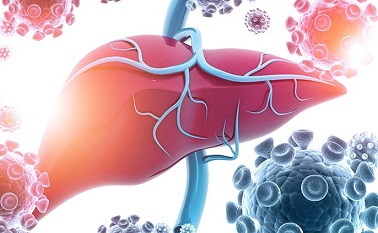Argentinian Researchers Warn That SARS-CoV-2 Could Be A Hepatotropic Virus That Also Manipulates Glucose Metabolism!
COVID-19 News - SARS-CoV-2 - Hepatotropic Jun 08, 2023 1 year, 10 months, 2 weeks, 1 day, 14 hours, 42 minutes ago
Study reveals how COVID-19 affects liver cells and raises concerns about long-term consequences
COVID-19 News: Researchers from Argentina's Universidad Abierta Interamericana, Consejo Nacional de Investigaciones Científicas y Técnicas (CONICET), and Maimonides University have uncovered a stunning connection between SARS-CoV-2, the virus responsible for the COVID-19 pandemic, and the liver. Their findings suggest that SARS-CoV-2 could be a hepatotropic virus, capable of infecting liver cells and manipulating glucose metabolism. This revelation sheds new light on the complex relationship between viral infections and non-communicable diseases, raising concerns about the long-term consequences of COVID-19.

As modern societies grapple with the burden of non-communicable diseases such as cardiovascular diseases, cancers, chronic respiratory diseases, and diabetes, the emergence of infectious diseases like COVID-19 has introduced a new dimension to the global health landscape. Researchers have observed that individuals with pre-existing conditions are at a higher risk of severe COVID-19 outcomes. However, the underlying molecular mechanisms and causal links between viral infections and non-communicable diseases remain largely unknown.
Unveiling the Hepatotropic Nature of SARS-CoV-2
Barreto and his colleagues' recent publication provides compelling evidence that SARS-CoV-2 directly triggers hyperglycemia by infecting hepatocytes, the main cells in the liver. Their study utilized retrospective clinical data, laboratory analyses, and postmortem liver biopsies to examine the effects of SARS-CoV-2 on glucose metabolism. Remarkably, they discovered that the virus induces gluconeogenesis, the process by which the liver produces glucose, through the stimulation of a critical enzyme called PEPCK.
https://www.pnas.org/doi/10.1073/pnas.2217119120
A New Frontier: Liver as a Target for SARS-CoV-2
While SARS-CoV-2 is primarily known for its respiratory effects, emerging evidence suggests a strong affinity for liver cells. Single-cell transcriptomic analysis has revealed that hepatocytes express the receptors utilized by SARS-CoV-2 to enter human cells. Moreover, autopsy studies on COVID-19 patients have confirmed the virus's ability to replicate efficiently in the liver. Barreto and his team's research demonstrated that SARS-CoV-2 can infect and replicate within primary human hepatocytes, although without causing significant damage to the liver.
Unraveling the Mechanisms: Beyond ACE2 and GRP78
While Barreto et al. identified ACE2 and GRP78 as key receptors facilitating SARS-CoV-2 entry into liver cells, it is likely that other factors contribute to viral internalization. Notably, the inhibition of both ACE2 and GRP78 receptors resulted in a diminished viral impact, suggesting the involvement of additional cell-entry mechanisms. Understanding these processes fully is crucial to grasp the potential clinical consequences of SARS-CoV-2's hepatic tropism, including the possibility of chronic liver infection.
The Mystery o
f Glucose Metabolism Manipulation
The researchers' discovery of SARS-CoV-2-induced gluconeogenesis in infected hepatocytes raises intriguing questions about the virus's preference for this energy-producing pathway. While some viruses induce glycolysis, the researchers found that SARS-CoV-2 stimulates PEPCK activity, thereby promoting glucose synthesis. The exact molecular mechanisms responsible for this metabolic reprogramming are yet to be fully elucidated but may involve mitochondrial activity alteration, microRNA regulation, and epigenetic modifications within host-infected cells.
Long COVID-19 and Post-Acute Sequelae
The manipulation of hepatic metabolism by SARS-CoV-2 could have significant clinical implications, particularly in patients experiencing long-term effects of COVID-19. A growing body of evidence suggests that individuals may develop type 2 diabetes in the post-acute sequelae stage of the disease. Possible explanations include persistent viral infection in the liver and gut, or long-lasting epigenetic alterations that impair glucose regulation. These findings underscore the need for further research to comprehend the full spectrum of COVID-19's impact on long-term health.
Thailand Medical News in its various past
COVID-19 News coverages have also warned that the liver is a target for the SARS-CoV-2 virus and that long term effects of COVID-19 infections can also result in non-alcoholic fatty liver diseases and also liver cancer!
https://www.thailandmedical.news/news/new-york-clinicians-sound-the-alarm-covid-19-asymptomatic-individuals-can-suffer-acute-liver-injury
https://www.thailandmedical.news/news/covid-19-research-university-of-bristol-researchers-warn-that-liver-complications-are-common-in-covid-19-patients
https://www.thailandmedical.news/news/coronavirus-news-german-study-confirms-that-sars-cov-2-coronavirus-can-invade-and-damage-the-liver
https://www.thailandmedical.news/news/breaking-covid-19-news-brazil-study-shows-that-most-long-covid-individuals-continue-to-sustain-damaged-liver-functions-up-to-20-months
https://www.thailandmedical.news/news/researchers-alarmingly-find-that-metabolic-associated-fatty-liver-disease-mafld-may-be-a-prevalent-long-covid-manifestation
https://www.thailandmedical.news/news/breaking-more-emerging-chinese-research-studies-shows-that-the-sars-cov-2-coronavirus-also-attacks-the-kidneys,-pancreas-and-liver
https://www.thailandmedical.news/news/breaking-covid-19-news-sars-cov-2-that-causes-liver-impairment-in-many-also-cause-hypoalbuminemia
https://www.thailandmedical.news/news/breaking-covid-19-research-studies-warn-of-high-prevalence-of-liver-injury-in-covid-19-patients
https://www.thailandmedical.news/news/covid-19-research-the-detrimental-effects-of-tnf%CE%B1-on-liver-during-sars-cov-2-infection-and-its-impact-on-patient-survival
https://www.thailandmedical.news/news/breaking-sars-cov-2-infection-induces-increase-of-gp73-that-causes-dysglycaemia-increased-gp73-could-also-imply-future-liver-disease-and-liver-cancer
https://www.thailandmedical.news/news/belgium-researchers-warn-that-more-hospitalized-covid-19-patients-are-manifesting-a-rare-chronic-liver-disease-known-as-sclerosing-cholangitis-could-b
https://www.thailandmedical.news/news/breaking-study-finds-that-upregulated-interleukin-6-drives-development-of-rare-liver-cancers-covid-19-infections-causes-elevated-il-6-levels-in-many
Conclusion
The study by Argentinian researchers has shed light on the intriguing relationship between SARS-CoV-2 and the liver. The discovery that the virus infects hepatocytes and manipulates glucose metabolism raises important questions about the long-term consequences of COVID-19, particularly in individuals with pre-existing non-communicable diseases. This research paves the way for future investigations into the molecular mechanisms underlying viral infections and their impact on human health. As the world continues to grapple with the COVID-19 pandemic, understanding these complex interactions is crucial for effective prevention, treatment, and long-term management of the disease.
The Argentinian researchers’ warnings were published as a spotlight article in the peer reviewed journal: Trends in Molecular Medicine.
https://www.cell.com/trends/molecular-medicine/fulltext/S1471-4914(23)00115-6
https://www.cell.com/action/showPdf?pii=S1471-4914%2823%2900115-6
For the latest
COVID-19 News, keep on logging to Thailand Medical News.
Read Also:
https://www.thailandmedical.news/news/covid-19-drugs-latest-japanese-study-shows-association-between-high-serum-favipiravir-concentrations-and-drug-induced-liver-injury
https://www.thailandmedical.news/news/fatty-liver-disease-increases-risk-of-covid-19-hospitalization-but-majority-do-not-even-know-they-have-fatty-liver-disease
https://www.thailandmedical.news/news/are-the-new-sars-cov-2-variants-circulating-in-europe-more-neuropathogenic-with-a-modified-pathogenesis-brain-and-liver-issues-on-the-rise
